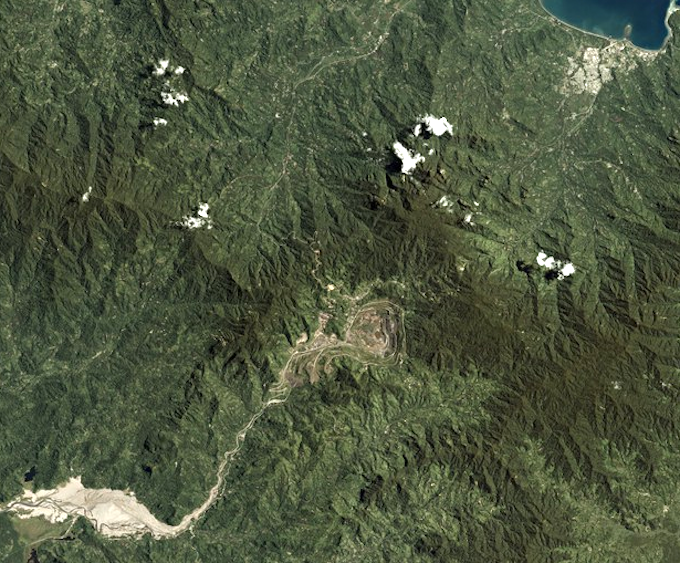
By Harry Pearl of BenarNews
An initial hearing of a class action against mining giant Rio Tinto over the toxic legacy of the Panguna copper mine on the autonomous island of Bougainville has been held in Papua New Guinea.
The lawsuit against Rio Tinto and its subsidiary Bougainville Copper Limited (BCL) is seeking compensation, expected to be in the billions of dollars, for what plaintiffs allege is historic mismanagement of the massive open copper-and-gold mine between 1972 and 1989.
More than 5000 claimants backed by anonymous investors are seeking damages for the destruction that sparked a 10-year-long civil war.
The Panguna mine closed in 1989 after anger about pollution and the unequal distribution of profits sparked a landowner rebellion. As many as 20,000 people — or 10 percent of Bougainville’s population — are estimated to have died in the violence that followed between pro-inependence rebels and PNG.
Although a peace process was brokered in 2001 with New Zealand support, deep political divisions remain and there has never been remediation for Panguna’s environmental and psychological scars.
The initial hearing for the lawsuit took place on Wednesday, a day ahead of schedule, at the National Court in Port Moresby, said Matthew Mennilli, a partner at Sydney-based Morris Mennilli.
Mennilli, who is from one of two law firms acting on behalf of the plaintiffs, said he was unable to provide further details as court orders had not yet been formally entered.
A defence submitted
Rio Tinto did not respond to specific questions regarding this week’s hearing, but said in a statement on September 23 it had submitted a defence and would strongly defend its position in the case.
The lawsuit is made up by the majority of villagers in the affected area of Bougainville, an autonomous province within PNG, situated some 800km east of the capital Port Moresby.

At least 71 local clan leaders support the claim, with the lead claimant named as former senior Bougainville political leader and chief of the Basking Taingku clan Martin Miriori.
The lawsuit is being bankrolled by Panguna Mine Action, a limited liability company that stands to reap between 20-40 percent of any payout depending on how long the case takes, according to litigation funding documents cited by the Organised Crime and Corruption Reporting Project.
While the lawsuit has support from a large number of local villagers, some observers fear it could upset social cohesion on Bougainville and potentially derail another long-standing remediation effort.
The class action is running in parallel with an independent assessment of the mine’s legacy, supported by human rights groups and the Autonomous Bougainville Government (ABG), and funded by Rio Tinto.

Rio Tinto agreed in 2021 to take part in the Panguna Mine Legacy Impact Assessment after the Melbourne-based Human Rights Law Centre filed a complaint with the Australian government, on behalf of Bougainville residents.
Legacy of destruction
The group said the Anglo-Australian mining giant has failed to address Panguna’s legacy of destruction, including the alleged dumping of more than a billion tonnes of mine waste into rivers that continues to affect health, the environment and livelihoods.
The assessment, which is being done by environmental consulting firm Tetra Tech Coffey, includes extensive consultation with local communities and the first phase of the evaluation is expected to be delivered next month.
ABG President Ishmael Toroama has called the Rio Tinto class action the highest form of treason and an obstacle to the government’s economic independence agenda.
“This class action is an attack on Bougainville’s hard-fought unity to date,” he said in May.
In February, the autonomous government granted Australian-listed Bougainville Copper a five-year exploration licence to revive the Panguna mine site.
The Bougainville government is hoping its reopening will fund independence. In a non-binding 2019 referendum — which was part of the 2001 peace agreement — 97.7 percent of the island’s inhabitants voted for independence.
PNG leaders resist independence
But PNG leaders have resisted the result, fearful that by granting independence it could encourage breakaway movements in other regions of the volatile Pacific island country.
Former New Zealand Governor-General Sir Jerry Mateparae was appointed last month as an independent moderator to help the two parties agree on terms of a parliamentary vote needed to ratify the referendum.
In response to the class action, Rio Tinto said last month its focus remained on “constructive engagement and meaningful action with local stakeholders” through the legacy assessment.
The company said it was “seeking to partner with key stakeholders, such as the ABG and BCL, to design and implement a remedy framework.”
Copyright ©2015-2024, BenarNews. Republished with the permission of BenarNews.











































